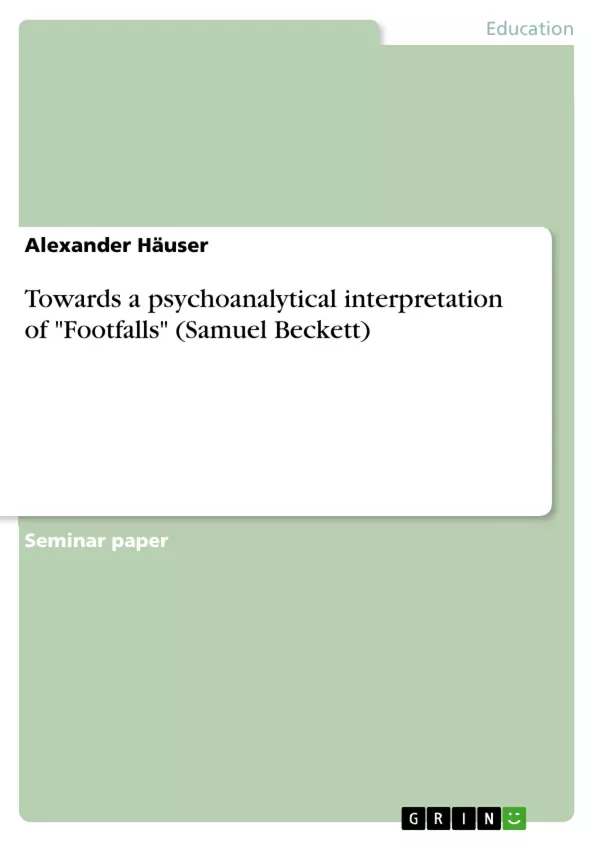As this term paper is mainly about the psychoanalysis, it is necessary to ask, how much Beckett knew about this explicit field of psychology. The concept of psychoanalysis, first established in the early 20th century, may for sure had particular influence on Beckett’s thoughts and plays as not only Footfalls contains ideas in it. Beckett himself attended a psychotherapist, after his father’s death in 1933. “He remained in therapy for two years with Wilfred R. Bion […] whose later writing on psychoanalytical theory are considered among the most eminent and original in the field.” The reason for his collapse may be found in his relationship to his mother whose “savage loving made him what he was”. Connor adds, that Beckett’s may have experienced the lost of his father “as a confirmation of the loss of his second father, Joyce, who had broken angrily with him after Beckett’s abortive affair with Lucia” , James Joyce’s daughter. The notes he made about psychoanalytical theories, when he was in therapy, had been discovered after his death, so it is very likely that he used some of them for his later plays.
Inhaltsverzeichnis (Table of Contents)
- 1. An introduction to Beckett's psychoanalytical knowledge
- 2. Psychoanalytical elements in Beckett's Footfalls.
- 2.1 An example of hysteria
- 2.1.1 May's pacing as a result of a suppressed trauma
- 2.1.2 The longing for a proof of existence as a search for identity
- 2.2 May and the aspects of her ‘egos'
- 2.2.1 The mother-daughter relationship in detail
- 2.2.2 May, the id and her super ego
- 2.3 The search for salvation in the depth of a soul
- 2.3.1 A Freudian dream interpretation of ‘I heard you deep in my sleep' ......
- 2.3.2 'Walking up and down his poor arm' and ‘Lacrosse' as allusion to human suffering………..\n
- 3. Examples of how Beckett's form and style intensifies a psychoanalytical approach ...........
- 4. Conclusion.
- Beckett's knowledge of psychoanalysis
- The presence of hysteria in "Footfalls"
- May's repressed trauma and its effect on her behavior
- The relationship between May's conscious and unconscious mind
- The role of dreams and subconscious imagery in May's psyche
Zielsetzung und Themenschwerpunkte (Objectives and Key Themes)
This term paper analyzes Samuel Beckett's play "Footfalls" through a psychoanalytic lens. The paper explores Beckett's knowledge of psychoanalysis and how he incorporated these ideas into his writing. The paper will focus specifically on the character of May and her psychological state, examining her actions and dialogue for evidence of hysteria, trauma, and the influence of the id, ego, and superego.
Zusammenfassung der Kapitel (Chapter Summaries)
The first chapter delves into Beckett's personal connection to psychoanalysis, exploring his therapy sessions and his exposure to Freudian and Jungian theories. This chapter highlights the potential influence of psychoanalysis on Beckett's work, particularly in "Footfalls."
The second chapter examines the character of May in "Footfalls" through the lens of hysteria. It explores the concept of hysteria as defined by Freud and Breuer, focusing on May's pacing, her suppressed trauma, and the potential for her to be suffering from dissociative identity disorder (DID). The chapter also touches on the idea of the unconscious mind and how it influences behavior.
Schlüsselwörter (Keywords)
Key keywords and concepts explored in this term paper include psychoanalysis, hysteria, trauma, unconscious mind, Freudian theory, Jungian theory, dissociative identity disorder (DID), the id, the ego, the superego, and the search for identity. The paper also touches on the influence of these concepts on Beckett's writing, specifically his play "Footfalls."
- Quote paper
- Alexander Häuser (Author), 2011, Towards a psychoanalytical interpretation of "Footfalls" (Samuel Beckett), Munich, GRIN Verlag, https://www.grin.com/document/190015



